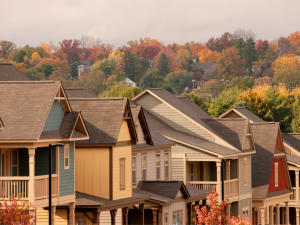For homeowners’ associations (HOAs), there’s no better way to build camaraderie than through fun and engaging events. With the holidays fast approaching, now is the time to start coordinating your community’s big festivities. Planning these events takes time; thoughtful preparation and execution are essential. By addressing important planning factors before hosting a community-wide event, everyone’s guaranteed to have a very merry time.
At CMA, we’ve spent decades helping associations host joyful holiday events with ease. In this eBook, we provide step-by-step instructions for organizing an unforgettable get-together. Here’s the first step:
Define the Purpose
The first step in planning your holiday event should be to define the purpose of the gathering and what you hope to achieve. For example, if your goal is to give back, think about doing a toy drive.
If you want to encourage connections, a Friendsgiving celebration could be a great option. Establishing a clear objective will help guide your decisions throughout the planning process.
Holiday Community Event Ideas
The holidays are the perfect time for getting together with friends, family, and neighbors. Whether you’re sharing laughs at a block party or heartfelt moments at a close-knit gathering, a holiday event doesn’t have to be extravagant for people to feel cherished, included, and joyful. No matter your budget, there are many seasonal community traditions that can make spirits bright.
A homeowners’ association board of directors can foster that warm-inside feeling by hosting a community holiday celebration that everyone will enjoy. Here are 10 great winter event ideas for every type of community association:
Association Friendsgiving
A modern twist on the traditional Thanksgiving, Friendsgiving is a Thanksgiving-themed meal with friends. This year, consider hosting a Friendsgiving with the neighborhood. Plan a potluck-style feast where residents can contribute dishes. It’s easy; simply:
- Plan a location, date, and time.
- Send invitations and create a sign-up sheet for members to add their dishes.
- Recruit volunteers to help prepare, set up, and decorate for the occasion.
Once everything’s in order, sit back and relax as neighbors get to know each other, express gratitude, and savor what they’ve prepared.
Cookie Swap
Ask community members to bake their favorite cookies and organize a trade of the delicious treats. Invite people to meet at a central location, like the HOA clubhouse, for an eventful exchange. Other ideas to elevate the experience include:
- Host a class with a local baker.
- Share cookie recipes.
- Hold a blind taste test and reward the best cookie.
- Add other treats for a full spread of snacks.
Holiday Decoration Contest
Encourage community members to decorate their homes and front lawns with seasonally appropriate décor. While you’ll need to communicate any holiday decoration rules and guidelines beforehand, this is a fun way to incorporate a little friendly competition. Coordinate a panel of judges to score the design choices based on:
- Creativity
- Coordination
- Quality
- Theme
Award the highest-scoring home a prize that’s attractive to all residents and let the creativity shine!
A Merry Movie Night
A movie night is the perfect family-friendly holiday event. Put out a call in your newsletter to gauge everyone’s preferred festive flicks or send a poll of movie choices and ask for votes.
Then, settle on a movie and a date for the event and provide popcorn and other theater snacks for viewers to munch on. Popular movies that are appropriate for all ages include:
Santa Meet & Greet
Bring some of the magic of the season to life by putting together a Santa meet and greet. Arrange for a Santa to visit your community or have a board member take the mantle themselves. Set up enough time for all the kids in your association to visit the jolly fellow and have cameras ready to go.
Ugly Sweater Party
Embrace the humor of holidays with an ugly sweater party. Ask community members to don their most outrageous seasonal sweaters while everyone mixes and mingles over food and drinks. You can host a competition for the ugliest sweater or give out superlative-based awards to a variety of outfits, like:
- Best/Worst Dressed
- Most Colorful
- Most Creative
- Best Accessories
Gingerbread House Decorating
If you’re looking for a family-friendly learning experience, a gingerbread house decorating content is a must-do. From icing to gumdrops, supply all needed ingredients and decoration kits for gingerbread houses and let guests get artsy.
Holly Jolly Mixology
Make spirits bright with a holiday mixer for adults. Hire a mixologist to lead a webinar on crafting the best holiday cocktails. An event in which members don’t have to leave the comfort of their own homes, when residents learn together virtually, it nourishes the sense of community—and eliminates the need for community equipment and cleanup.
New Year’s Carnival
The holidays aren’t complete without a New Year’s community event. Ring in 2026 with a carnival-style party for all community members. Set up game booths and entertainment that you’d find at a carnival, like:
- A bounce house
- Maze
- Balloon art demonstration
- Cornhole
Creating a playful atmosphere will give your community members the opportunity to feel like a kid again, leave worries behind, and relish the excitement.
Charity Drive
Get into the spirit of giving with a donation drive to support your local community. Organize an event to collect:
- Clothing
- Toiletries
- Canned goods
- Toys
Promote the drive, set clear collection deadlines, and let residents know what their contributions are going towards. Giving back allows residents to work together, generate positive change, and spread joy.


